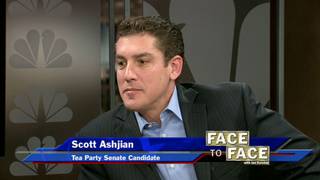Tuesday, March 9, 2010 | 2:01 a.m.
Sun Coverage
Republicans are so convinced that the fall midterm elections could be a repeat of 1994, the year that ushered them into the majority in Congress, they are reaching into the playbook for the prop that helped propel that victory: a new Contract with America.
House Republicans have tapped one of their own to begin casting for ideas to form a 10-point legislative to-do list, promises candidates would make to voters this fall.
Only problem is, the Tea Party movement beat them to it.
For months, Tea Party activists have been crafting a Contract from America, a soon-to-be released document from the renegade conservative movement.
Not to be outdone, a cadre of old-guard conservatives headed by former Attorney General Edwin Meese and backed by the conservative Heritage Foundation this month launched a broad decree known as the Mount Vernon Statement.
For a political party being criticized as the party of no, the flurry of manifestos offers an aggressive effort to stand for something.
“There is a perception that the 1994 Contract with America contributed to the Republican victory, and a lot of people on the conservative side of the aisle want history to repeat itself,” said John Pitney, a former Republican operative who is now a government professor at Claremont McKenna College.
“They’re also aware they need to be for something,” he said. “They want to define themselves rather than let the other side define them.”
The original Contract with America was essentially a small-government 10-step program — a “detailed agenda for national renewal, a written commitment with no fine print,” it said.
The now almost legendary document championed by then-Republican Rep. Newt Gingrich of Georgia outlined a series of legislative proposals Republican candidates vowed to bring to the House floor for a vote, if elected.
Some of the ideas came to pass in various forms over the years — a reduction of the estate tax and the marriage penalty. Others, including term limits, still loom large in the Republican psyche as brass rings just out of reach.
Today’s drafters insist the new contract, with the working title of “Commitment to America,” will not be a Washington-driven document, but one compiled from the ground up.
“It won’t be a document handed down from on high by politicians, because something like that would land with a big thud,” said House Minority Leader John Boehner of Ohio, in announcing last month at an annual conservative political conference that he had named fellow Republican Rep. Kevin McCarthy of California to lead the effort. “It’s going to be built by listening.”
Part of the intent here is to counter the Tea Party movement, to assure those independents and conservatives flocking to the vocal group that the Republican Party wants them to stay under its tent.
Republican Sen. John Cornyn of Texas, who chairs his party’s campaign committee in the Senate, explained the importance of keeping Tea Party candidates in the fold come November, rather than launching third-party campaigns.
“Third-party races are not good,” Cornyn told reporters Monday.
Tea Party's Scott Ashjian

Viewing video requires the latest version of Adobe's Flash Player
In Nevada, a potential Tea Party candidate for the U.S. Senate race, Jon Scott Ashjian, could siphon off Republican and independent voters, handing embattled Senate Majority Leader Harry Reid a victory.
“It’s important that their energy and enthusiasm be channeled in the Republican primary process and that ultimately it’s about nominating the strongest candidate to run against the Democrat,” Cornyn said.
A document might convince Tea Partyers the Republican Party hears their concerns.
But whether a display of limited government ideals would attract a wider swath of swing voters remains unclear. Scholars note that times have changed since the 1994 uprising.
Despite the Tea Party’s rejection of an activist federal government that is bailing out banks and stimulating the economy, there remains a sizable portion of voters who want the government to solve problems.
A traditional conservative Republican prescription of tax cuts, balanced budgets and deficit reduction becomes a trickier endeavor when Americans want unemployment benefits, affordable health care and the country is fighting two wars.
“The question facing the political leaders today is whether there are agenda items out there that have a great deal of public appeal,” Pitney said.
“That’s a lot harder to do today,” he said. “You can get a lot of support for cutting government in the abstract. When you start enumerating what these cuts would be, it’s a different story.”

Join the Discussion:
Check this out for a full explanation of our conversion to the LiveFyre commenting system and instructions on how to sign up for an account.
Full comments policy